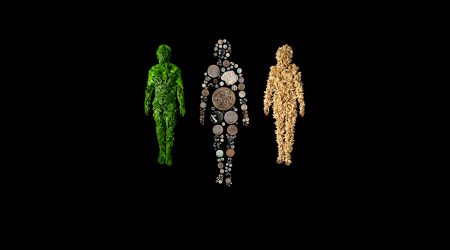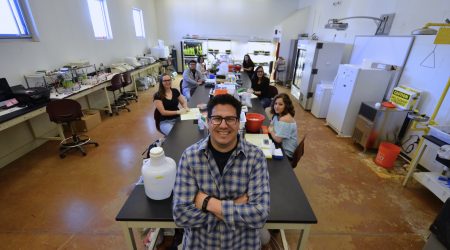The EDESIA PhD programme puts plants at the heart of nutrition
A ground-breaking training programme launched in autumn 2020 aims to create a new generation of nutritionists.
The EDESIA: Plants, Food and Health PhD programme will advance understanding of plant-based nutrition from crop to clinic, initiating a step-change in nutritional research in the UK and addressing diet-related illness which cost billions globally.
Named after the Roman goddess of food who emphasised the good things we get from our diets, EDESIA reflects a growing recognition that plant-based foods are critical in tackling chronic illness such as cancers, diabetes and cardiovascular disease.
Vice-director of the programme Professor Cathie Martin says, “The loss of plant-based, unrefined foods from the human diet means more people are burdened with nutritional insecurity and associated chronic illnesses. Understanding how plant-based foods promote and protect health will underpin effective future dietary recommendations, food choices and food production. If we want to improve the health of future societies world-wide, we need more evidence and this programme will start to address that.”
The unique cross-disciplinary PhD programme draws together world-class research expertise of the Norwich Research Park in a collaboration that includes the University of East Anglia (UEA), the John Innes Centre, Quadram Institute, the Earlham Institute and the Norfolk and Norwich University Hospital.
Twenty-five EDESIA students – five per year for five years – will work to unravel the complex inter-relationship between plant-based foods, metabolism, the gut microbiota and health outcomes. The first PhD students began in October 2020.
The £5m programme is funded by the Wellcome Trust as part of £127m worth of awards to support 23 new PhD programmes.
The EDESIA programme will increase opportunities for metabolic engineering, innovative bioinformatics, human intervention studies and optimising crops by state-of-the-art approaches such as speed breeding and genome editing.
Professor Martin says, “During the lockdown we have heard a lot about the importance of exercise to health and getting on your bike. That’s fine as far as it goes but I’m very much on Jamie Oliver’s side – you need to think about diet. EDESIA will train the next generation of nutritionists who understand the importance of plants to a healthy diet. It’s a chance to get people thinking about how plants are produced.”
The Wellcome funding signals a new approach to blend scientific excellence with a commitment to improving research culture. The programme includes holistic support for the personal, professional and technical development of students during their PhD and in the transition to the next stage of their career.
EDESIA: first impressions
Yvie Morgan is one of five students to start on the multi-disciplinary EDESIA PhD programme in autumn 2020
What motivated you to apply for a place on the EDESIA programme?
During my undergraduate degree (Biological Sciences at UEA), I volunteered in a lab that investigated the role of sulforaphane – a sulphur-rich, broccoli-derived compound that has been shown to slow cancerous cell differentiation in culture.
This triggered my deeper interest in the importance of a plant-based diet in disease prevention and the wider health-related benefits of plants.
My previous experience with crop genome editing at the John Innes Centre is what initially attracted me to the EDESIA programme.
EDESIA is unique in its aim to pioneer a multidisciplinary approach to plant-based nutritional research, drawing on world-renowned expertise from across the Norwich Research Park. This pioneering attitude also extends to its pledge to provide support poststudentship, helping to bridge the gap into industry and academia.
Why are the all-round nutritional skills offered by EDESIA needed?
Around three million in the UK are estimated to be malnourished, with two billion worldwide experiencing deficiency of essential micronutrients deemed ‘hidden hunger’.
Current strategies – namely chemical fortification of foods and micronutrient supplements – are costly and can have adverse side effects at high doses.
By both tailoring endogenous gene expression in crops and reducing anti-nutrient content, we can improve the bioavailability of micronutrients directly at the food source.
Tell us about your current project?
For my first rotation I am working alongside Professor Ailsa Welch and Dr Richard Hayhoe in the school of Medicine at UEA. I’m analysing the NDNS (National Diet and Nutrition Survey) dataset, which is a governmental cross-sectional rolling programme designed to assess the diet, nutrient intake and nutritional status of the UK general population.
The aim of this rotation is to improve my knowledge of nutritional epidemiology and apply statistical techniques to address health-related questions. For example, micronutrient status is crucial in providing a basis to prevent the risk of poor COVID-19 outcomes and facilitate optimal responses to vaccination – a timely demonstration of the constant importance of nutrition.
The skills I gain from my rotations will be invaluable in enabling me to shape my final PhD project.
How has COVID-19 changed the day-to-day running of the programme?
As the EDESIA team cannot meet in person, we discuss our experiences/experiments online, while also presenting papers in a fortnightly journal club.
Personally, COVID-19 has prevented me from working with dieticians in a clinical environment. However, as we look forward to 2021, we’ve been invited to attend a virtual City Food Lecture featuring talks by Mel Smith, CEO of Ocado Retail. This way we keep in touch with the continually evolving food industry.
I am also looking forward to my second and third rotations with Dr Catrina Edwards (Quadram Institute) and Dr Janneke Balk (John Innes Centre) respectively.
What are your hopes for the future?
It is early to say but I would ultimately like to have a project where I am bio-fortifying a particular fruit, vegetable or cereal crop.
To address future public-health needs, biofortified crops must provide nutritional enhancement, without compromising flavour and nutrient bioavailability.
It is also important to understand any wider influences the crop might have on the gut microbiome or food processing. Although global yields of starchy crops have almost doubled since the 1960s, micronutrient content has stagnated.
I’m inspired by biofortification strategies, like those used to enhance beta-carotene content to prevent vitamin A deficiencies, in crops like golden rice, cassava, sweet potato and maize.
Around 67 countries in the world have adopted biotech crops; it’s frustrating that farmers and consumers in this country do not have the choice to access GM-associated benefits. I’m hoping that in time we could be in a position where these important technologies are legislated for and we will be able to harness their potential.







